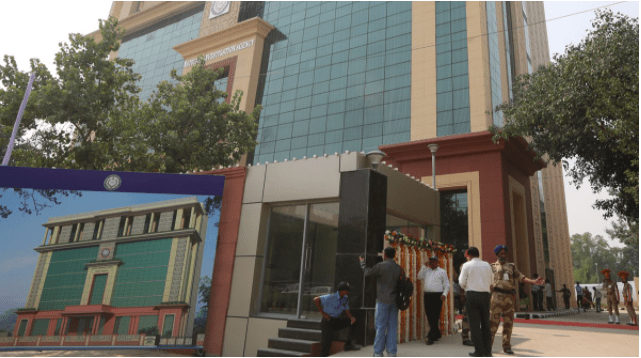“The NIA had learnt about an inter-state module of al-Qaeda operatives at various locations in India including West Bengal and Kerala. The group was planning to undertake terrorist attacks at vital installations in India with an aim to kill people and strike terror,” the agency said in a statement.
The National Investigation Agency (NIA) Saturday claimed to have foiled plans for terror strikes in various parts of the country with the arrest of nine alleged al-Qaeda operatives reportedly acting at the behest of handlers from Pakistan.
The agency arrested the nine in early morning raids at Murshidabad in West Bengal and Ernakulam in Kerala, and claimed to have recovered countrymade pistols, a rudimentary body armour, batteries, switches, firecrackers, literature on home-made IEDs and other “incriminating material” from them, apart from a map marking out vital installations in Delhi which were reportedly among their targets.
Sources said the nine had been under surveillance for a few months and the arrests were made based on inputs that they were preparing for an attack. An FIR was registered on September 11.
All nine belong to Murshidabad district. Seven are either daily wage labourers or in menial jobs, while two are doing their graduation at a Murshidabad college. Perumbavoor in Ernakulam, from where two of the men were held, is a major migrant hub in Kerala.
Six of those held from Murshidabad district belong to its areas bordering Bangladesh, such as Jalangi, Domkol and Raninagar, and were known to be religious. Sources said their families were not aware of their alleged involvement in terror activities. The three held from Ernakulam had been coming to Kerala to work as labourers for years.
“The NIA had learnt about an inter-state module of al-Qaeda operatives at various locations in India including West Bengal and Kerala. The group was planning to undertake terrorist attacks at vital installations in India with an aim to kill people and strike terror,” the agency said in a statement.
“As per preliminary investigation, these individuals were radicalised by Pakistan-based al-Qaeda terrorists on social media and were motivated to undertake attacks at multiple places, including the National Capital Region… the module was actively indulging in fund-raising and a few members of the gang were planning to travel to New Delhi to procure arms and ammunition,” the NIA said.
An NIA source said the group was led by Murshid Hassan, who works as a casual labourer at Ernakulam. An official said they acted after getting to know the group had recently procured batteries, switches, wires and firecrackers. “They planned to use potassium chlorate gleaned from the crackers as explosives for bombs,” the official said.
He also claimed that the group had procured some firearms from Delhi which they were supposed to deliver in Kashmir on the directions of their Pakistani handlers. However, the official said, they were yet to be told which group in Kashmir would receive them.
Apart from Hassan, those arrested include Iyakub Biswas and Mosaraf Hossen (also held from Ernakulam) and Najmus Sakib, Abu Sufiyan, Mainul Mondal, Leu Yean Ahmed, Al Mamun Kamal and Atitur Rehman (held from Murshidabad).
Fire crackers and batteries seized by NIA.While Biswas is employed as a cook at Perumbavoor, Hossen has been working as a salesman at a garment shop in the town for seven years. Hossen’s wife and two children live with him in Kerala. The NIA said Sufian is a Raninagar-based tailor currently working as a farmer; Mondal, a resident of Madhubona village in Choyapara, is a cook; and Kamal of Nawdapara of Domkal a mason who doubles as a driver. Villagers have told the police Mondol used to visit Kerala frequently before the lockdown.
Rahman, who stays in Ghoshpara, is a second-year arts student at a Murshidabad college, while Sakib, a resident of Domkal town, is doing graduation in computer science there. Ahmed, who was photographed wearing what the NIA called a body armour, is an electrician at a college. Ahmed, also a resident of Domkal, was reportedly very active on social media and the police said most of his posts were on religion.
A senior Murshidabad police officer who did not want to be identified told The Sunday Express that the villagers had said the men kept to themselves. “Their backgrounds are being checked and everything is being verified,” the officer said.
The alleged leader of the group, Murshid Hassan, lived in a room with six other migrants from West Bengal in Ernakulam, having moved in after some of the tenants left for West Bengal following the lockdown. Hassan did odd jobs in the Eloor industrial area in Kochi for a living, and had not gone home for at least a year.
House owner Nazar K J, who says he let Hassan stay after checking his ID and other details, said, “He didn’t appear too keen on looking for work every day. I don’t know whether it was due to lack of opportunities.”
Hossen’s employer V M Aboobacker as well as landlord Anwar R said they were shocked at the charges. Aboobacker said he had never had cause to be suspicious in the seven years Hossen had worked for him. “He is one of two salesmen at my showroom. When free, he would be on his phone. I often scolded him over this addiction.”
Anwar said Hossen and his family rented a house from him three months ago. “We never saw anyone visit him. His wife is clueless about the charges,” he said.
Harris E C, who supplies paranthas to hotels, said he had hired Biswas in May and that he had worked at hotels before. “After working six to seven months in Kerala, he used to return to Bengal,” Harris said, adding that he also arranged a room for Biswas to stay nearby. “For six days in a week, he worked from 2 am to 10 am, and then from afternoon till late evening.”
Harris said neither he nor his co-workers suspected anything. “Biswas stayed in his room after work.”


